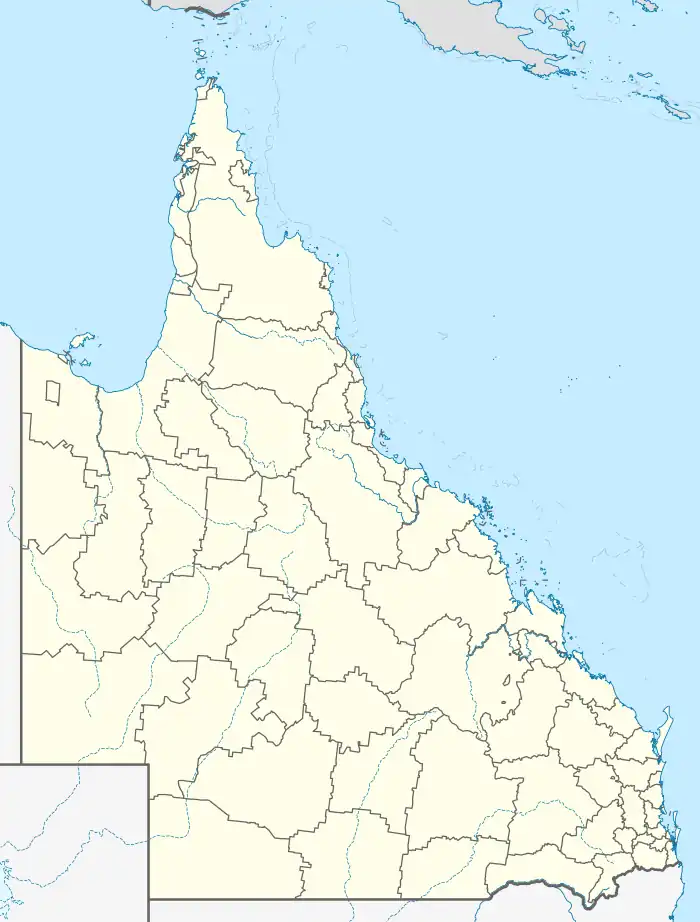| Yelarbon Queensland | |||||||||||||||
|---|---|---|---|---|---|---|---|---|---|---|---|---|---|---|---|
 Painting the silos, 2019 | |||||||||||||||
 Yelarbon | |||||||||||||||
| Coordinates | 28°34′27″S 150°45′15″E / 28.5741°S 150.7541°E | ||||||||||||||
| Population | 364 (2016 census)[1] | ||||||||||||||
| • Density | 0.7184/km2 (1.8606/sq mi) | ||||||||||||||
| Postcode(s) | 4388 | ||||||||||||||
| Area | 506.7 km2 (195.6 sq mi) | ||||||||||||||
| Location |
| ||||||||||||||
| LGA(s) | Goondiwindi Region | ||||||||||||||
| State electorate(s) | Warrego | ||||||||||||||
| Federal division(s) | Maranoa | ||||||||||||||
| |||||||||||||||
Yelarbon is a rural town and locality in the Goondiwindi Region, Queensland, Australia.[2][3] It is on the border of Queensland and New South Wales.[4] In the 2016 census, Yelarbon had a population of 364 people.[1]
Geography
Yelarbon is in south-central Queensland on the Dumaresq River, near the New South Wales border. It sits on the Cunningham Highway midway between Goondiwindi and Inglewood.
 Lagoon, Yelarbon
Lagoon, Yelarbon Old bridge, Desert Creek Rd, Yelarbon
Old bridge, Desert Creek Rd, Yelarbon Spinifex Country, Yelarbon
Spinifex Country, Yelarbon
History
Bigambul (also known as Bigambal, Bigumbil, Pikambul, Pikumbul) is an Australian Aboriginal language spoken by the Bigambul people. The Bigambul language region includes the landscape within the local government boundaries of the Goondiwindi Regional Council, including the towns of Goondiwindi, Yelarbon and Texas extending north towards Moonie and Millmerran.[5]
Yelarbon is an Aboriginal Australian word meaning "Native name for the large lagoon adjacent to the Station."[6]
It was the first place in Queensland to grow tobacco commercially.
At the 2006 census, Yelarbon had a population of 448.[7]
In the 2016 census, Yelarbon had a population of 364 people.[1]
Economy
Nowadays, cattle and sheep are raised, and cereal crops are grown. A major employer in Yelarbon is the A. E. Girle and Sons sawmill.[8]
Transport
The town is located on a branch of the narrow gauge South Western railway line; it is also proposed to be located on a section of the standard gauge Inland Railway from Moree via North Star.
Education
Yelarbon State School is a government primary (Prep–6) school for boys and girls at 17 Eena Street (28°34′27″S 150°45′13″E / 28.5743°S 150.7536°E).[9][10] In 2018, the school had an enrolment of 41 students with 6 teachers (3 full-time equivalent) and 6 non-teaching staff (4 full-time equivalent).[11]
There is no secondary school in Yelarbon. The nearest secondary schools are Goondiwindi State High School in Goondiwindi (to Year 12) and Inglewood State High School in Inglewood (to Year 10 only).[4]
Recreation
There is fishing on the Dumaresq River as well, nearly all recreational. The Murray Cod is one of the more sought-after prizes to catch.
References
- 1 2 3 Australian Bureau of Statistics (27 June 2017). "Yelarbon (SSC)". 2016 Census QuickStats. Retrieved 20 October 2018.
- ↑ "Yelarbon – town in Goondiwindi Region (entry 38591)". Queensland Place Names. Queensland Government. Retrieved 6 May 2020.
- ↑ "Yelarbon – locality in Goondiwindi Region (entry 47841)". Queensland Place Names. Queensland Government. Retrieved 6 May 2020.
- 1 2 "Queensland Globe". State of Queensland. Retrieved 6 May 2020.
- ↑ "Bigambul". State Library of Queensland. Retrieved 15 January 2020.
- ↑ Queensland Railways correspondence No. 08.393, 17 July 1908 written by Chief Engineer, W. Pagan, to The Secretary, Office of the Commissioner for Railways. Letter is held in the Queensland Railways correspondence files at Queensland State Archives. Ref: A/12427 1908.
- ↑ Australian Bureau of Statistics (25 October 2007). "Yelarbon (Waggamba Shire) (State Suburb)". 2006 Census QuickStats. Retrieved 25 June 2011.
- ↑ Kerr, John (January 1998). "West to Ipswich and Toowoomba" (PDF). Geographical Overview of Sawmilling. Archived (PDF) from the original on 13 April 2020. Retrieved 14 April 2020.
- ↑ "State and non-state school details". Queensland Government. 9 July 2018. Archived from the original on 21 November 2018. Retrieved 21 November 2018.
- ↑ "Yelarbon State School". Yelarbon State School. 21 June 2022. Retrieved 29 September 2023.
- ↑ "ACARA School Profile 2018". Australian Curriculum, Assessment and Reporting Authority. Retrieved 28 January 2020.
External links
- "Yelarbon". Queensland Places. Centre for the Government of Queensland, University of Queensland.
- "Town map of Yelarbon". Queensland Government. 1984.
- Regional Info on Yelarbon